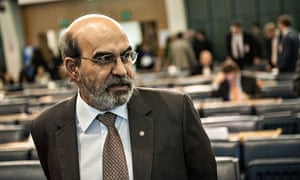Professionals Network | The Guardian
Improving nutrition and food security - global development professionals network
Family farms are model farms, says FAO chief
José Graziano da Silva, director general of UN's Food and Agriculture Organisation, talks about his hopes for sustainable food production in the international year of family farming
Francesco Rampa in Brussels
Wed 19 Feb 2014 22.28 AEDTFirst published on Wed 19 Feb 2014 22.28 AEDT

José Graziano da Silva says family farming plays a crucial role in sustainable food production. Photograph: Giorgio Cosulich/Getty Images
There are an estimated 500m family farms in the world, and family farming is the predominant form of agriculture and main food producer in developed and developing countries.
The rising Africa narrative suggests that there will be a 4.7% growth rate in African economies in 2014, but while this offers opportunities to rural farmers, they often struggle to meet growing demands and find themselves at a disadvantage due to high costs, and low bargaining power.
However, with adequate support, according to director general of the Food and Agriculture Organisation, José Graziano da Silva, they can quickly realise their productive potential. "They can increase the availability of food in poor communities, preserve traditional food products, support the shift to more balanced diets, safeguard the world's agro-biodiversity and contribute to food security and sustainable development as a whole.
"Nothing comes closer to the sustainable food production than family farming. The preservation of natural resources is rooted in their productive logic; and the highly diversified nature of their agricultural activities gives them a central role in promoting the sustainability of our food systems and ensuring food security."
This makes it key for family farmers to participate in the ongoing post-2015 debate, while also helping to achieve the current UN's millennium development goals.
Regional dialogues with the family farmers, Graziano da Silva said, have shown that overall their needs are similar throughout the world. These include technical assistance and policies that build on their knowledge and bolster sustainable productivity increase, special attention to women and youth farmers and efforts to improve their participation in value chains.
"Governments can show their political commitment by building judicial frameworks, institutions and policies that address the needs of family farmers. Establishing platforms for policy dialogue with family farmers organisations in order to generate consensus and build and implement effective policies is another major target of the international year of family farming.
"International co-operation can foster policy dialogue among all stakeholders and help build and support the implementation of concrete and sustainable solutions," he added.
Agriculture is also high on Africa's agenda for 2014; it is the African Union year of food security, and a crucial year for the Comprehensive African Agriculture Development Process (CAADP). The FAO is exploring options to create synergies between this and the IYFF.
CAADP was launched in 2003, and it has helped to place agriculture at the top of the development agenda. Currently, about 40 African countries are engaged in the CAADP process: 36 have signed CAADP compacts, about 28 have formulated investment plans, and 20 business meetings have been organised. The objective is to increase national investment in agriculture as well as mobilise additional international resources.
The bulk of the countries engaged in this process have increased the percentage of their national budget going to the agricultural sector, although most are still far from the 10% target of the Maputo declaration. Further, 15 countries have received between $20m and $50m from the Global Agricultural and Food Security Programme.
Graziano da Silva said: "CAADP compacts and investment plans are helping to align investment in agriculture towards a combined growth-and-food security objective. Their development has been accompanied, in some cases, by transformative policy reforms and public expenditure analyses, and has helped to mobilise new innovative financing mechanisms in support of African agriculture.
"To a certain degree, this process has provided a forum where civil society and the private sector – producer organisations in particular – can participate in continental, regional and national discussions on agricultural investment priorities. FAO has been closely involved in the process, providing funding, technical assistance and human resources at country, regional and continental levels."
Political commitment to promote food security received a boost last year: in July 2013 at a meeting co-organised by the African Union, FAO and the Lula Institute, African countries set 2025 as the target date to end hunger.
Francesco Rampa is the programme manager of the ECDPM Food Security programme. Follow @Francesco_Rampa on Twitter. This article was originally published in ECDPM's monthly Great Insights.

